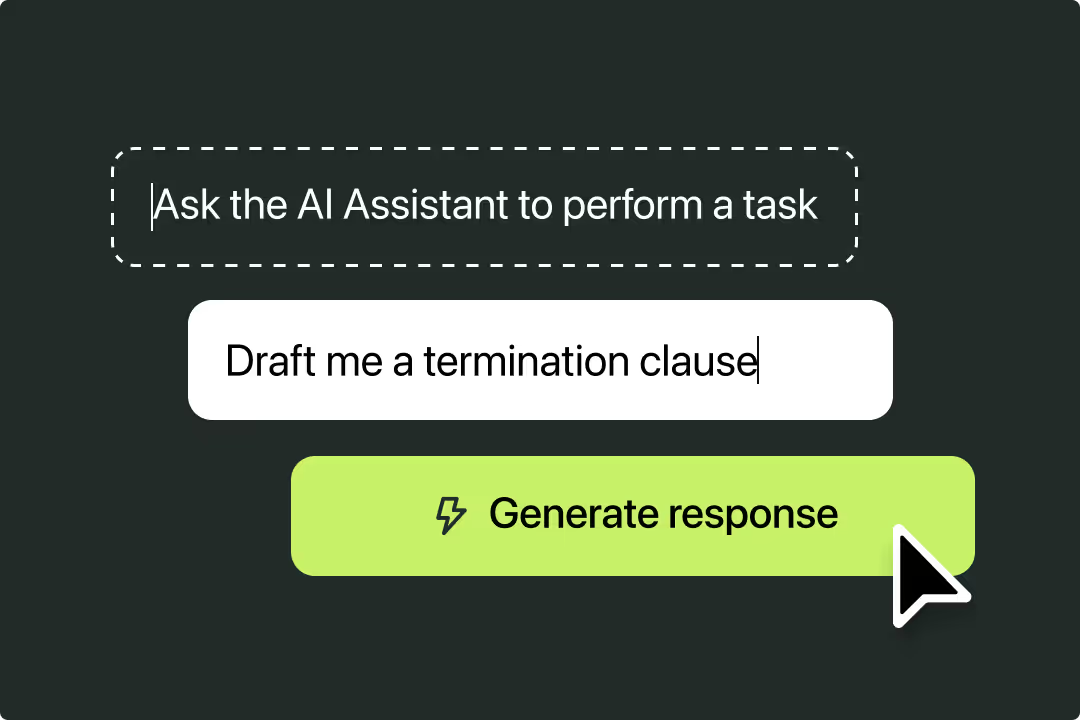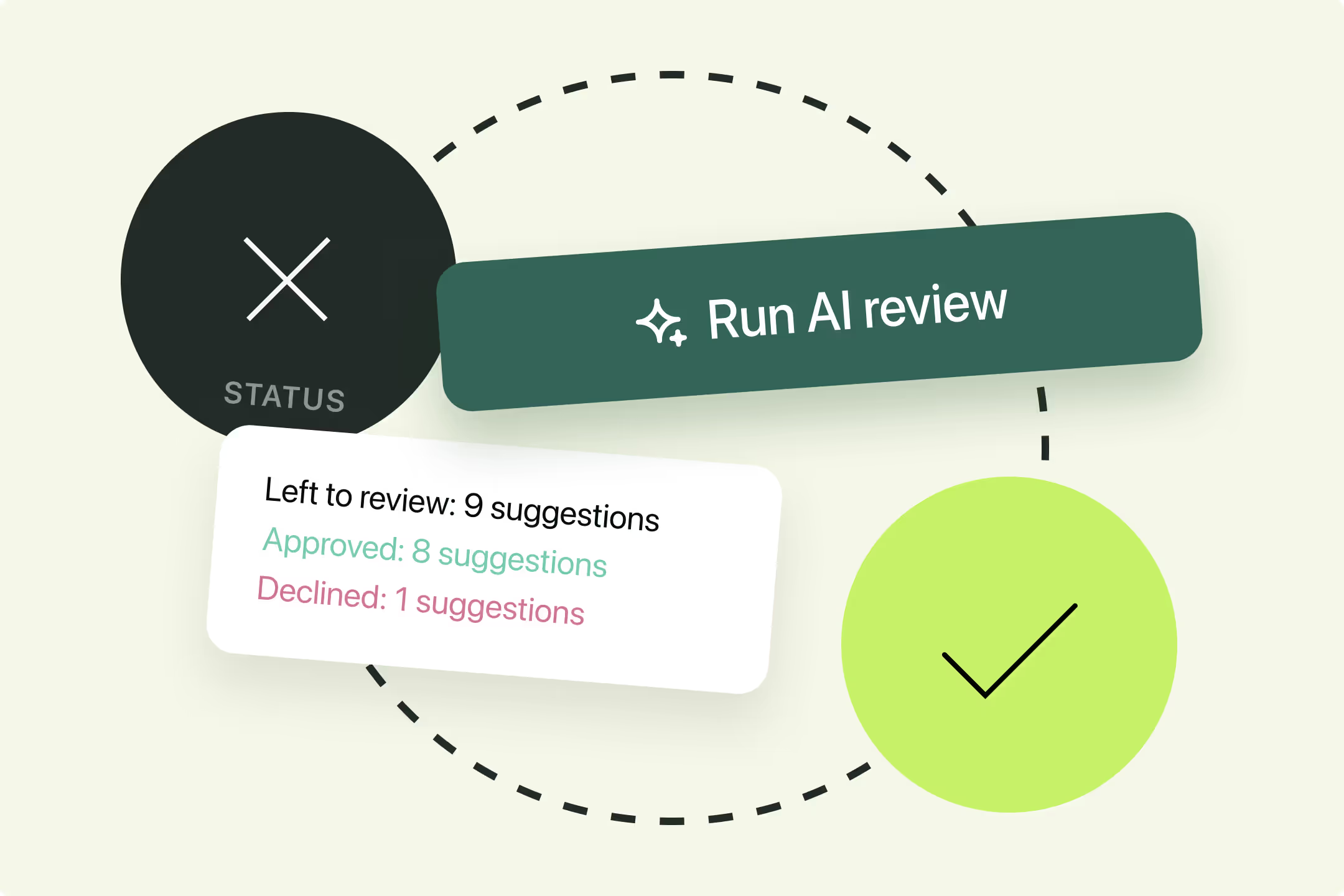Solutions
Customer Support
Resources
Lawyers and legal professionals spend countless hours drafting, reviewing, and analyzing legal documents. However, manual processes make this work more difficult than it needs to be.
Fortunately, AI can transform the way businesses manage their legal documents. This article will cover exactly how your team can leverage AI for legal documents in 2026 - and how it can give you a competitive edge.
Artificial intelligence (AI) can be used to manage legal documents. In fact, legal AI tools can automate repetitive tasks and process bodies of text in seconds. As a result, legal AI assistants serve as effective tools for lawyers who want to reduce admin work and free up time for higher-value tasks.
In a climate where two thirds of GCs report feeling ‘buried in low-value work’, AI offers lean legal teams a competitive advantage in the form of increased productivity. With the right tools, they can manage their legal documents faster and more efficiently than ever before.
{{quote1}}
Instead of spending hours manually drafting contracts, agreements, and other legal paperwork, lawyers can use AI contract tools to automate the process.
AI-enabled tools use natural language processing and machine learning algorithms to generate entire legal documents in seconds. Legal teams can also ask an AI assistant to draft, or redraft, certain parts of the document.

AI Assistant can also help to improve the language you use in your legal documents and improve readability. For example, you can ask Juro’s AI Assistant to rewrite a clause to make it shorter and written in plain English. The AI will then generate a new version of that part of the legal document.
{{quote2}}
Want to find out more about how you can use AI to draft and generate legal documents? Check out this guide to AI contract generation.
Legal teams can also use AI to review their legal documents and identify any risks, inconsistencies, or deviations from their standard terms and provisions.
For example, you could ask AI to summarize how each party’s liability is limited under the legal document. You could also use AI tools to flag any exclusivity obligations or restrictive covenants in a contract.
Lawyers can also use ChatGPT for this task. However, they will need to make sure they:
Due to the reasons listed above, AI contract review software is often a far better solution for lawyers who want to streamline the review process.

Businesses that use Juro’s AI contract tool can:
Want to find out what sets Juro’s AI contract collaboration platform apart from other AI-enabled tools? Hit the button below for your personalized demo and find out how Juro enables teams to agree contracts up to 10x faster.

Legal AI tools are also capable of extracting and analyzing important data from legal documents. This is a great use case for legal teams that manage a lot of contracts and need fast access to the insights within them.
Some AI platforms will even generate contract summaries and contract abstracts for legal documents, making it easy to cut through the jargon and share important takeaways with other stakeholders.
AI can transform the way your business manages its legal documents, but only if you choose the right solution. That's why it's important to evaluate the tools properly to find one that's well aligned with your needs. You can do this in a few ways.
Start by identifying your specific needs and pain points. Are you looking to streamline document generation, enhance document review, or improve document analysis?
Perhaps you want to do all three, meaning that AI contract management software will be better suited than a point solution. Knowing your goals will help you narrow down the options and select an AI tool that aligns best with your requirements.
Consider how flexible and customizable you need the AI solution to be. Legal documents can vary significantly, so the AI tool syou choose hould be able to accommodate various document types, formats, and language specifics. It's also worth looking for an AI platform that supports playbooks, like Juro. That way, you can customize the inputs at scale.
Consider how well the AI solution integrates with your existing software and systems. It should seamlessly fit into your workflow, allowing for a smooth transition and collaboration with other team members.
Legal documents often contain sensitive and confidential information. It's crucial that you choose an AI solution that places a strong emphasis on data security and compliance with legal and ethical standards. For more information, check out this guide to using AI responsibly.
Consider carefully the risks of using AI, but also consider the risks of not using AI. Weigh them up and decide on a plan that works for you and your business.
It's important to remember that different businesses have different risk appetites. What works for one business won't work well for another. You need to have these discussions internally and weigh up the risks and rewards accordingly.
Juro's AI enabled contract collaboration platform is secure and integrates seamlessly with your existing workflows, enabling you to agree contracts 10x faster than traditional tools.
With Juro, you can use AI to draft, review, summarize, and extract data from your contracts in seconds.
This means faster routes to revenue and reduced costs throughout the contract lifecycle. To find out more about how Juro's legal AI can streamline the way you manage legal documents, fill in the form below.
Lorem ipsum dolor sit amet, consectetur adipiscing elit. Suspendisse varius enim in eros elementum tristique. Duis cursus, mi quis viverra ornare, eros dolor interdum nulla, ut commodo diam libero vitae erat. Aenean faucibus nibh et justo cursus id rutrum lorem imperdiet. Nunc ut sem vitae risus tristique posuere.

